The Garden of Death, Hugo Simberg, 1896
Jenni Nurminen / Finnish National Gallery / Ateneum Art Museum
In the late 19th century, artists were going goth. Works like Vincent van Gogh’s Head of a Skeleton With a Burning Cigarette (1886), Edvard Munch’s By the Deathbed (1893) and Hugo Simberg’s The Garden of Death (1896) exemplified a preoccupation with mortality.
However, while their works were informed by the era’s troubles, these painters didn’t create such motifs in a vacuum. Now, an exhibition in Helsinki, Finland, examines how they looked to medieval art for inspiration.
“Gothic Modern: From Darkness to Light” at the Ateneum Art Museum places medieval and Renaissance art beside the work of modern masters, highlighting the Gothic themes that connect them. Per a statement from the museum, all the artworks on display “deal with the big questions of life … in a brutal manner and with dark humor.”
Dance on the Quay, Hugo Simberg, 1899
Aleks Talve / Finnish National Gallery / Ateneum Art Museum
Art history focuses on the flourishing scene in Paris, where “Impressionism became Post-Impressionism, which led to Cubism, and then the birth of abstraction,” as the New York Times’ Nina Siegal writes. But for many Northern European artists in the late 19th and early 20th centuries, the center of culture was Berlin, which attracted artists interested in a “darker, more spiritual interpretation of life”—often inspired by prevailing themes from the Middle Ages.
“What comes from a medieval Gothic worldview, as this exhibition illuminates, is the passion of pain, the passion of yearning for the spiritual, for a greater meaning of the mysteries of a world,” as exhibition co-curator Anna-Maria von Bonsdorff, Ateneum’s director, tells the Art Newspaper’s Stephen Smith.
Many renowned artists took inspiration from such morbidity. For example, van Gogh’s Head of a Skeleton, which depicts a skeleton with a cigarette between its teeth, lends a casualness to death. The Dutch artist painted it as part of an anatomy exercise, and some experts think he was just having a laugh, per the Times.
By the Deathbed, Edvard Munch, 1896
Aleks Talve / Finnish National Gallery / Ateneum Art Museum, Sihtola collection
However, as von Bonsdorff tells the publication, the skull could also be a reference to the “dance of death,” the idea of death’s inevitability that was a frequent subject of European art during the late Middle Ages. “Because it has a cigarette, and it’s grinning, it has this very modern attitude,” von Bonsdorff tells the Times. “It’s death in a modern setting, death as the dandy.”
Munch, the Norwegian painter of The Scream (1893), was influenced by German medieval art, while Austrian artist Marianne Stokes drew on medieval Gothic themes. These artists may have been responding to their period’s industrialization, social turbulence and international tensions, with Europe inching toward World War I, as exhibition co-curator Juliet Simpson tells the Times. According to the statement, the exhibition is unexpectedly relevant to modern crises: Curators began preparing it before the Covid-19 pandemic and the war in Ukraine.
An installation view of “Gothic Modern: From Darkness to Light,” which is on display at the Ateneum Art Museum
Hannu Pakarinen / Finnish National Gallery
As von Bonsdorff tells the Art Newspaper, young people today “don’t share the ideas of older generations of a fixed identity, belief in utopias, that the world is going to get better, or there’s such a thing as heaven on earth.” The modern artists featured in the exhibition were plagued with similar beliefs—and they found meaning in past eras’ clearheaded focus on mortality.
“These types of images in Western art since the medieval period have served to remind the viewer of life’s brevity and of a painter’s skill in rendering that mournful dilemma,” von Bonsdorff adds. “We need rituals to guide us, to navigate the dark times, to make sense of living—not with a view that tomorrow will always come, but in the power of the present.”
“Gothic Modern: From Darkness to Light” is on view at the Ateneum Art Museum in Helsinki through January 26, 2025.


